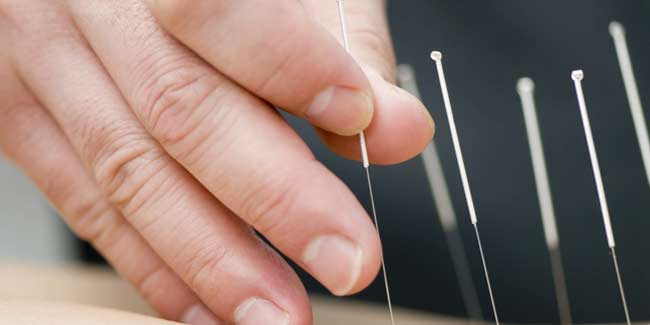
Acupuncture is an ancient art of healing that help patients seeking pain relief and other health concerns. The practice is safe and relatively painless when professionally administered. The World Health Organization (WHO) recognises acupuncture therapy for 47 medical conditions. These include back/leg pain, acne, insomnia asthma, labour pain, morning sickness, infertility, obesity and irritable colon syndrome. The idea behind acupuncture treatment is that it works to regulate the nervous system. The practitioner stimulates certain acupuncture points with the help of needles, which release biochemicals and ease pain.
The World Health Organization (WHO) recognises acupuncture therapy for 47 medical conditions. These include back/leg pain, acne, insomnia asthma, labour pain, morning sickness, infertility, obesity and irritable colon syndrome. The idea behind acupuncture treatment is that it works to regulate the nervous system. The practitioner stimulates certain acupuncture points with the help of needles, which release biochemicals and ease pain.
Acupuncture is a low-risk procedure, safe and effective procedure when performed by a properly trained and licensed practitioner. But like any other procedure there are certain risk and side-effects associated with acupuncture. These include:
Table of Content:-
- Disease transmission if the needles are not sterilized properly. Few cases of hepatitis B and C transmission through use of non-sterile acupuncture needles have been reported.
- Bruising or a hematoma at the site where needles pierces the skin.
- If the needle is not properly placed there is a risk of damage to nerves, other organs like brain, kidney, or lung, when deep needling is done in these areas.
- Headache, nausea, lightheadedness or fainting, fatigue, and anxiety—these are the less serious side-effects of acupuncture but occur more commonly.
- Temporary worsening of symptoms can occur in some people.
- If a patient is really weak from a chronic condition, this could lead to tiredness following a session. If you do not eat properly, fatigue may follow.
How to avoid the side-effects of acupuncture
- Confirm the credentials of the person whom you are consulting. Get a second opinion before you go for acupuncture.
- Before you go for acupuncture to treat a certain pain, confirm if acupuncture is recommended and is successful in treating the particular condition.
- Ensure that your acupuncturist uses sterile, disposable needles. This will reduce your risk of acquiring an infection such as hepatitis B and C.
As of now, there is limited evidence on acupuncture as an effective treatment for medical conditions. It seems to be a low-harm treatment, most of the adverse effects of acupuncture are associated with the nature of the practitioner's training.
How we keep this article up to date:
We work with experts and keep a close eye on the latest in health and wellness. Whenever there is a new research or helpful information, we update our articles with accurate and useful advice.
Current Version
